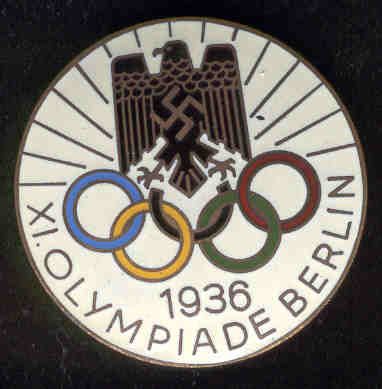Nazi film part of torch relay runner preparation
Nazi Film Shown As Part of Relay Runner Prep!
Torch relay video ignites frustration
By Marsha Lederman, The Globe and Mail, Tuesday, February 2, 2010
/www.ctvolympics.ca/torch/news/newsid=29734.html
Before their run with the Olympic flame, torchbearers are loaded
onto shuttle buses for the drive to their spot on the route. On board, they're shown a promotional video. Meant to inspire and excite them, the video depicts the history of the torch relay, beginning in ancient Greece.
But the video is raising eyebrows: it uses shots from the film Olympia, directed by Leni Riefenstahl, who made propaganda films for Adolf Hitler, most notably Triumph of the Will. And it also alters a scene to remove evidence of its connection to the Nazis.
"I was very surprised to see that it appeared in their formal, official welcome to the Olympic relay promo," said Ira Nadel, professor of English at the University of British Columbia, who has studied Riefenstahl. "I think that [the filmmakers] probably were somewhat unaware of the context of the footage."
The first Olympia scene used by VANOC depicts torchbearers in ancient Greece. This was Reifenstahl linking the ancient Athenians and the Aryan people, races she deemed to be superior.
Next comes a shot of a torchbearer entering an enormous stadium filled with Olympia, hundreds of people give the Nazi salute. The VANOC video obscures this by framing the shot in black.
"I know that they thought maybe they were doing the right thing by removing the explicit signs of the Nazi event, but I think it's a mistake," said Richard Menkis, a UBC historian who helped put together an exhibition on the 1936 Olympics at the Vancouver Holocaust Education Centre.
"I think that [VANOC] should have been smarter," he said. "I don't think they should be using footage from the '36 torch relay."
VANOC refused a request for an interview on the issue, but said in a statement: "Olympia was the first documentary feature film on the Olympic Games ever made and offered historic footage. It was also the place where the Torch Relay as part of the Modern Olympic Games started."
(Professor Nadel and other historians say the torch relay was invented for the 1936 Games.)
VANOC says it considered three options: leave the Berlin footage out, alter it, or use it as is.
"We chose the middle ground, in order to respect the relay's history while not highlighting the political environment of the day," the statement said. "We weighed the decision carefully, as even though the Berlin 1936 Games footage lasts only a few seconds, we wanted to try and do the right thing to reflect the relay's past."
Professor Nadel isn't buying that. "I think it's a whitewash," he said. "If they were serious about what they're saying, they wouldn't have included it."
The Canadian Jewish Congress isn't impressed either.
"The entire 1936 Games and images related to those Games are rooted in hate," said Romy Ritter, regional director of Canadian Jewish Congress, Pacific Region. "The 1936 Games represents a hateful and distressing period for our community and we wish that the footage wasn't included at all.
"With that said, we acknowledge that attempts were made to edit out the most offensive and disturbing images, although in hindsight we wonder whether they could not have found 22 seconds of other footage from other Games to use in its place."
Public reaction to the video - called Lights will guide you home after the lyrics to the Coldplay song that accompanies the images - has been mixed. Many comments on YouTube address its power, saying it brought people to tears. But others question the use of the Riefenstahl material. "Footage from Nazi propaganda films to promote 2010 Olympic Games! Nice touch, Canada!" wrote one person.
Professor Nadel thinks the debacle is rooted in ignorance and bad decision-making. "It was the Summer Games, it wasn't even the Winter Games," he points out. "That's really, pardon me, idiotic."
